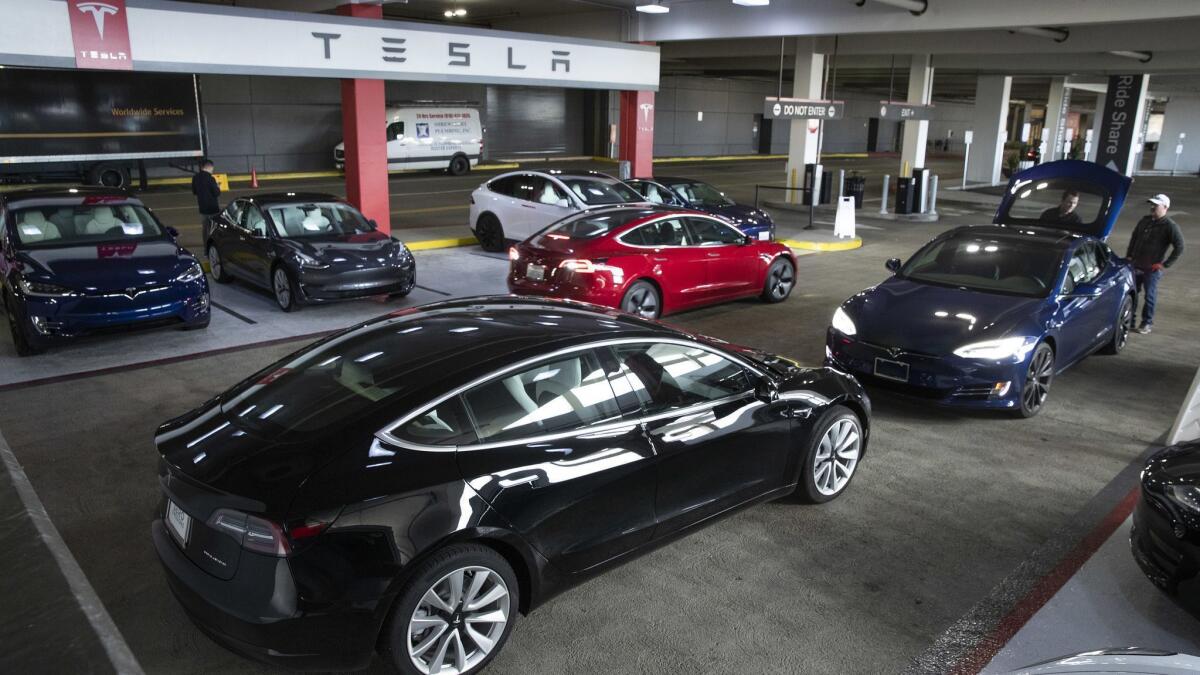Tesla deliveries fall sharply in the first quarter, especially for its highest-margin cars

- Share via
Electric-car maker Tesla Inc. delivered sharply fewer vehicles to customers in the first three months of the year, raising questions about the strength of demand for its product lines as it ramps up assembly of the newest sedan.
The Palo Alto company said Wednesday that it delivered about 63,000 vehicles to customers during the first quarter, a 31% drop from the previous quarter. The most dramatic drop-off was for Tesla’s highest-profit-margin vehicles, its Model S sedan and Model X SUV, which saw combined deliveries fall 56% from the previous quarter.
Tesla delivered 50,900 newer Model 3 cars and 12,100 older-model S and X vehicles in the first quarter. In the previous quarter, the company delivered 90,700 total vehicles to customers, including 63,150 Model 3 cars and 27,550 Model S and X vehicles.
The first-quarter deliveries fell short of what Wall Street had expected. Analysts polled by FactSet before Wednesday’s news expected Tesla to deliver 76,000 vehicles during the first quarter, including 54,600 Model 3s.
The first-quarter numbers were partly affected by the decreasing federal tax credits available for electric-car purchases, which pulled deliveries into the fourth quarter, Tesla said. But the decline also came despite the company cutting prices and offering incentives on some models.
The numbers were “shockingly bad,” said Mark Spiegel of hedge fund Stanphyl Capital Management, which holds a significant short position in Tesla, meaning the firm is betting on the company’s stock price falling.
“The biggest problem with Tesla is just massive competition from established companies that know how to build high-quality cars profitably,” he said.
Overall, the Elon Musk-led company produced 77,100 vehicles in the first quarter. Of those, 62,950 were Model 3s. During the previous three-month period that ended in December, Tesla built 86,555 vehicles, including 61,394 Model 3s.
Tesla has staked its future on widespread demand for the Model 3, which has price points lower than its other luxury vehicles.
Shifting sales to a lower-margin product could hurt Tesla’s already stressed bottom line. The company signaled as much in its Wednesday release, saying: “Because of the lower than expected delivery volumes and several pricing adjustments, we expect Q1 net income to be negatively impacted. Even so, we ended the quarter with sufficient cash on hand.”
Tesla had warned of a temporary U.S. sales slump. The Model 3s that would otherwise go to eager U.S. customers instead were shipped to Europe and China, according to the company.
Disorganized delivery in Europe and China hurt sales, analysts said. But Tesla skeptics believe the fundamental problem is flagging demand.
The company has good reason to favor Europe and China right now. Model 3s were shipped to both markets for the first time this quarter. A number of higher-end electric cars from established carmakers in Europe are now hitting the market, and Tesla can’t afford to wait. In China, Tesla must prime the market before it begins building cars there for local consumers, which it plans to do later this year in a factory it’s building outside Shanghai.
Twitter: @smasunaga
More to Read
Inside the business of entertainment
The Wide Shot brings you news, analysis and insights on everything from streaming wars to production — and what it all means for the future.
You may occasionally receive promotional content from the Los Angeles Times.












